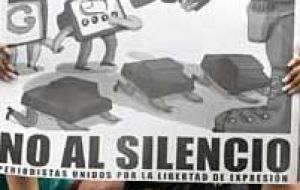MercoPress. South Atlantic News Agency
Sunday countdown test for Venezuelan media and Chavez
 Some said they did not like RCTV but defended its right to broadcast
Some said they did not like RCTV but defended its right to broadcast The countdown has begun for Venezuela's oldest private television station: midnight Sunday Radio Caracas Television, the most widely watched channel, will be forced off the air after President Hugo Chávez's government decided not to renew its licence.
The controversial decision which had divided Venezuelan public opinion and is seen as a further step of the Chavez administration to build a Cuban-style system in Venezuela by politicizing the military, judiciary and oil industry of the OPEC nation, has forced authorities to tighten security in Caracas. Hundreds of police and National Guard troops have been stationed along major avenues and dozens of armoured cars and military vehicles filed down the highways of Caracas in a show of force before the conflicting closure of an opposition television station. Both the opposition and Chavez supporters have been holding street demonstrations and are preparing for Sunday, the crucial day. An idea of the climate was given by TCTV show host Miguel Angel Rodriguez, whose programme is a daily rant against the Chávez regime, and on Friday ended his segment by blowing a kiss to the camera and saying defiantly: "There is no goodbye. It's 'see you later". On Thursday the US Senate unanimously passed a resolution against the "transgression of freedom of thought and expression" in Venezuela and so have most of Latinamerican parliaments. Regional private media is condemning the decision and have sent special envoys to Caracas to cover the event. Last Friday President Chávez, clad in military fatigues at the inaugural flight of Sukhoi fighter jets bought from Russia, also said the country was ready for any attack by "the oligarchy," a rich, pro-US elite which he says RCTV epitomizes. Chávez defends the decision as a legal move to democratize the airwaves by reassigning RCTV's licence to a public service channel. Chavez accuses RCTV of supporting the April 2002 coup which had him kidnapped for a few days by dissident military groups and later of promoting the several months' long oil industry strike which almost brought the regime to its knees. The government provided start up funding for the new channel, TVES, and says it will start broadcasting early Monday in some parts of the country. Meantime RCTV said it was waiting for a ruling from the Inter American Human Rights Committee which is looking into the case. "We've presented a demand before the IAHR committee against Venezuela for the violation of the right to free expression", said Oswaldo Quintana from TCTV legal department.




Top Comments
Disclaimer & comment rulesCommenting for this story is now closed.
If you have a Facebook account, become a fan and comment on our Facebook Page!